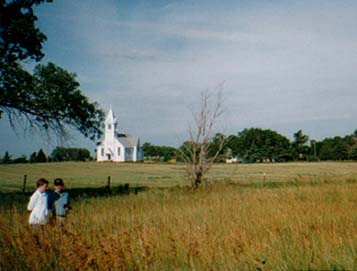This photo is dredged up from what once was a web site of mine, circa 1995. I got it to go with an article in the Weekend Edition of the WSJ, titled “Inconvenient Youths.” Here are samples:
In households across the country, kids are going after their parents for environmental offenses, from using plastic cups to serving non-grass-fed beef at the dinner table. Many of these kids are getting more explicit messages about becoming eco-warriors at school and from popular books and movies.
and
Some parents object to what they see as proselytizing by their kids’ schools. Mark D. Hill, who until recently was chairman of the Republican party in Marin County, says some mothers called him upset when their children came home from Bacich Elementary School in Kentfield, Calif., with fliers stuffed in their backpacks advertising a screening of “An Inconvenient Truth.” The parents thought the public school shouldn’t promote the screening, which was paid for by a local parent, because they considered it a political statement.
Sally Peck, the principal of Bacich, disagrees. “We have a responsibility to educate our children,” she says.
Mr. Hill says the mothers worried their children would be criticized if they spoke out, so they kept their names secret. “It’s very scary for mothers,” he says. “They kind of go with the programs because they don’t want to be viewed as trouble-makers.”
It would seem that Principal Sally Peck is having trouble distinguishing indoctrination from education. These people think it’s OK to indoctrinate kids in environmental morality, but watch what happens when you suggest that kids be taught sexual morality.
But it can’t be helped. Some sort of morality is going to be taught.
Here’s an idea, and this is where the photo comes in. The photo is of the old District No. 3 schoolyard in Bazile Mills, Nebraska. It was taken a couple of hours before my first bike tour ever, in summer 1995. The school was long gone, but I’m showing my youngest son where we used to play softball. When I was a kid we lived in a house to the right of the church in the photo, where my father was pastor. We usually walked to school across that field.
It was a two-room public school, and when the school consolidation movement came to Nebraska in the 1950s there was a big battle over whether the school should be closed and consolidated with the Creighton school, three miles away. My parents were on the anti-consolidation side. They were so unhappy with the high-handed techniques that had been used in an attempt to close the school that when it came time for me to go to high school, they didn’t send me to Creighton. They instead sent me to a smaller school to the north at Center, on the edge of the Santee Sioux reservation. I was fortunate to have had that experience — both the school experience and the witnessing of what my parents did to try to preserve quality of education.
What does that have to do with our little eco-warriors? Well, if teachers really want to teach about cutting down on greenhouse gases, they will want to teach the kids that the school districts should be broken up into small neighborhood schools — us-consolidated, if you will, so that not so much fuel will need to be burned transporting kids to school and school activities.
One photo I didn’t find was of the area at the base of the Gull Creek valley in Kalamazoo County, MI. That used to be the prettiest little valley in Kalamazoo County. It reminded me of Ireland somewhat. But when the community of Galesburg decided to build a new school, they did the same as so many others and built it out in the country where there was room for massive parking lots for all the kids who drive to school. It destroyed the lower end of that little valley. And who can blame kids for driving, or parents for driving their young ones, when the alternative is that abomination known as the school bus Whether children travel by bus or by car, if schools were unconsolidated it would make a huge difference in greenhouse gas emissions.
But no, just the opposite is being done. Our Gull Lake school district recently closed a fine little elementary school in Bedford — the one my youngest son attended. Now kids have to be transported a much greater distance to a centralized school. Given that research has shown that smaller community schools usually provide better education, the school district isn’t going to have much credibility the next time it appeals for more money.
Of course, teachers and administrators are -not- going to advocate decentralization. Doing so would give parents a greater say in their children’s education, which is anathema to the modern educational establishment. Environmental issues are OK up to a point, and that is one of those points.
